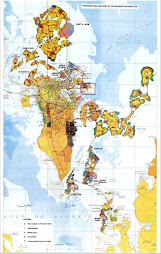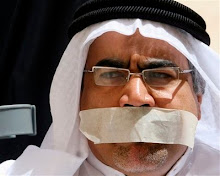Police 'use guns' at Bahrain protests
By Bill Law BBC Radio 4,
Crossing Continents
On 13 March at about 1530, unemployed dustman Muhammad says he stepped out into the street to join a peaceful demonstration to protest against brutality by the police forces.
Five minutes, later along with about 50 others, he says he was fired upon by members of the Bahraini security forces. He was hit in the legs with a shotgun blast.
Asked if he or the others had done anything to provoke or threaten the security police Muhammad (not his real name) replied "Absolutely not!"
"There was no violence," he insisted. "It was a peaceful demonstration. The police opened fire without provocation."
Video footage of the incident - supplied to the BBC by a Bahraini human rights organisation - would appear to corroborate Muhammad's account.
It shows a line of police standing near from a group of protesters carrying Bahraini flags. Suddenly and without any apparent cause, the police open fire.
Members of this island nation's Shia community say they had joined the protest against alleged police brutality.
Divisions in society
The tiny island kingdom of Bahrain is unique in the Arabian Peninsula in that it has a Shia majority, thought to be about 65% of the population.
But like the other Arab Gulf states the ruling elite is Sunni. And with the Shia Muslim-led Iran just across the Gulf and tensions growing between Islam's two largest sects, Shia here find themselves under suspicion.
Members of the ruling family and its Sunni supporters in parliament have long accused Iran of fomenting unrest in Bahrain. Bahraini Shia organisations say Iran has nothing to do with it. They say Shia have long been victims of discrimination.
“ There is an increasing level of force being used and all that is doing is creating anger and more violence ” Khalil al Marzok, MP
They accuse members of the royal family of seizing Shia land, and point to poor housing, high unemployment and employment discrimination as the root causes of what is now becoming almost nightly rioting in their villages.
Tear gas, rubber bullets and stun bombs are used to quell disturbances, but the alleged use of live ammunition signals a trend that is disturbing many people in Bahrain.
Khalil al-Marzok MP, a member of a Shia political party and a leading activist, says excessive use of force is making a volatile situation ever more dangerous, particularly for young Shia men.
"There is an increasing level of force being used and all that is doing is creating anger and more violence."
Government response
In a statement, a spokesperson from the Interior Minister's office told the BBC that the use of shotguns against ordinary citizens is not permitted as a general policy.
"Their use is allowed only in rare cases under the law, such as when people's lives are in danger or when the use of force becomes the only means for the security forces to perform their duty," the statement says.
It says all security personnel are aware of this policy and obey it.
But evidence of the use of live fire has continued to emerge. On 27 March, three children aged of 11 to 14 were reportedly hit by shotgun pellets, including one who was badly injured.
"We want a dialogue and we are trying to persuade the authorities that the opportunity to talk is still there," says another Shia MP, Jasim Husain.
But he says the political will to make that happen is not coming from either the ruling family or the government.
"Without dialogue," he says "I'm not sure where this country is going."
Bill Law is a reporter for BBC Radio 4's foreign affairs documentary series,
. You can also listen to Crossing Continents on the or subscribe to the
. Story from BBC
NEWS:http://news.bbc.co.uk/go/pr/fr/-/2/hi/middle_east/7976480.stm
Published: 2009/04/03 01:27:06 GMT© BBC MMIX
skip to main |
skip to sidebar

خارطة البحرين الجديدة
Facebook Badge
Followers
فسيلة السنكيس
متى ما ظهرت الفسيلة - الصغير من النخل- من فوق سطح الأرض، فمن حقها أن تنمو وان تعانق السماء دون حصار أو مضايقة أو استهداف
حق الفسيلة في الحياة كحق غيرها، من المخلوقات، خاصة وإن كانت دليل أصالة شعب كشعب البحرين
--------------------------------------------------------------
صاحب المدونة: د.عبدالجليل السنكيس
ناشط، كاتب وباحث أكاديمي من البحرين
البريد الإلكتروني: asingace@gmail.com
مدونة اخرى: http://alsingace.katib.org/
هاتف:8179-3966-973+
حق الفسيلة في الحياة كحق غيرها، من المخلوقات، خاصة وإن كانت دليل أصالة شعب كشعب البحرين
--------------------------------------------------------------
صاحب المدونة: د.عبدالجليل السنكيس
ناشط، كاتب وباحث أكاديمي من البحرين
البريد الإلكتروني: asingace@gmail.com
مدونة اخرى: http://alsingace.katib.org/
هاتف:8179-3966-973+
مواقع ووصلات ذات صلة Links of Interest
صور معبرة

خارطة البحرين الجديدة






